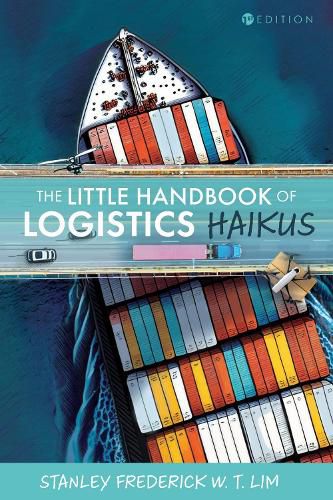Readings Newsletter
Become a Readings Member to make your shopping experience even easier.
Sign in or sign up for free!
You’re not far away from qualifying for FREE standard shipping within Australia
You’ve qualified for FREE standard shipping within Australia
The cart is loading…






This title is printed to order. This book may have been self-published. If so, we cannot guarantee the quality of the content. In the main most books will have gone through the editing process however some may not. We therefore suggest that you be aware of this before ordering this book. If in doubt check either the author or publisher’s details as we are unable to accept any returns unless they are faulty. Please contact us if you have any questions.
The Little Handbook of Logistics Haikus introduces readers to the principles of logistics management, innovatively presented through 60 haikus. Bridging the brevity of Japanese poetry and the complexity of supply chain management, the book synthesizes essential concepts with an artistic twist. The topics span the foundational pillars of supply chain and operations management, inventory management, warehousing, network design, and transportation to current trends such as last-mile delivery and the effects of the COVID-19 pandemic on logistics.
Structured to offer both theoretical and practical insights, the book presents each subject through haikus, followed by discussions that unpack the underlying ideas and applications. The concise poetic form aids in comprehension, making the learning process both efficient and memorable. While exploring operations management, students examine system-level thinking and the economic implications of logistical decisions on an overarching supply chain strategy.
The Little Handbook of Logistics Haikus is an ideal supplementary text for courses in logistics, transportation management, and supply chain management. Its unique approach makes it an excellent resource for students and instructors seeking a refreshing perspective on logistics principles and a creative pedagogical tool to enrich classroom discussions. The book also serves as a gentle introduction for members of the public wanting to learn about logistics in a more accessible format.
$9.00 standard shipping within Australia
FREE standard shipping within Australia for orders over $100.00
Express & International shipping calculated at checkout
This title is printed to order. This book may have been self-published. If so, we cannot guarantee the quality of the content. In the main most books will have gone through the editing process however some may not. We therefore suggest that you be aware of this before ordering this book. If in doubt check either the author or publisher’s details as we are unable to accept any returns unless they are faulty. Please contact us if you have any questions.
The Little Handbook of Logistics Haikus introduces readers to the principles of logistics management, innovatively presented through 60 haikus. Bridging the brevity of Japanese poetry and the complexity of supply chain management, the book synthesizes essential concepts with an artistic twist. The topics span the foundational pillars of supply chain and operations management, inventory management, warehousing, network design, and transportation to current trends such as last-mile delivery and the effects of the COVID-19 pandemic on logistics.
Structured to offer both theoretical and practical insights, the book presents each subject through haikus, followed by discussions that unpack the underlying ideas and applications. The concise poetic form aids in comprehension, making the learning process both efficient and memorable. While exploring operations management, students examine system-level thinking and the economic implications of logistical decisions on an overarching supply chain strategy.
The Little Handbook of Logistics Haikus is an ideal supplementary text for courses in logistics, transportation management, and supply chain management. Its unique approach makes it an excellent resource for students and instructors seeking a refreshing perspective on logistics principles and a creative pedagogical tool to enrich classroom discussions. The book also serves as a gentle introduction for members of the public wanting to learn about logistics in a more accessible format.